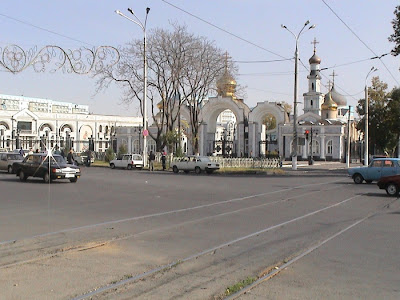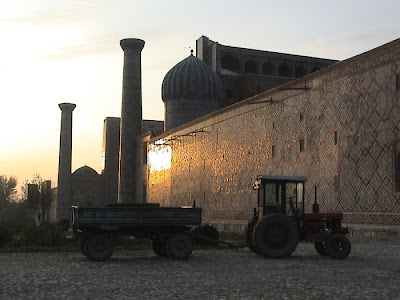Hidden Treasures: Willful Electoral Ignorance in Uzbekistan
I'm slightly addicted to news. If I go several days without hearing what is going on in the world, I run the risk of becoming as bad off as one of those pitiful laboratory rats, drained of some vital component that leaves his legs twitching or starts to make his hair fall out (or something awful like that). I need my news.
And so it might seem strange that one Tuesday night while in Tashkent, Uzbekistan, with a November chill very much in the air, I made the decision to not seek out news the next day, or perhaps even for the next several days.

Assumption Cathedral, Tashkent, Uzbekistan
The decision came on no ordinary day. Thousands of miles away Americans were taking their place in voting booths to either reelect George Bush or for the first time send John Kerry into office. The world, of course, was watching all this with interest, waiting not only to see if there might be a fiasco like the Florida thing four years earlier, but also to see what Americans would do about the globally unpopular Bush.
Since I wasn't near a polling station, much less my country, I decided to spend part of the evening in an Orthodox cathedral, in near darkness and in silence, watching the flickering flame of a candle beside the bench where I sat. I squinted through the dim light to look at icons depicting long dead saints--though the Orthodox would insert here that they are not dead but rather living in a realm we have yet to experience. I thought of the history that had preceded this moment in time, not just over the previous four years but also the past few millennia. What a wild, wild world we live in! So much carnage and destruction (the twentieth century was the bloodiest the world had seen), yet also so much beauty and wonder and creativity.
My hour or so in the church saw me in a considerably reflective mood. Most of my “reflectiveness” had to do with the year I had just spent on the road, and the fear that my readjustment back to the United States in less than two months would not go smoothly. But to a lesser extent I was also thinking about politics and policy, and the communal power of a people who cast a ballot every four years. Whoever Americans were voting for this day, I wondered how that person--Bush or Kerry--would shape the world in the years ahead. I wondered if he knew how daunting his responsibilities were, not only because his decisions would affect Americans but also because they would affect ordinary people from Kathmandu to Lima to Hanoi to Khartoum. No other person in the world has such power.
So why did I decide not to seek out the news that would tell me who won the election? In short, I wanted to know what it felt like to be willfully ignorant while the masses were informed. I wanted to walk the streets of Uzbekistan and breathe the autumn air knowing that I didn't know what everybody else knew. I wanted to do something that Americans back home couldn't easily do even if they tried: I wanted to not know who my President was (or would be).
My ignorance would only last 24 hours. The day after the election I took a bus five hours south to Samarkand and checked into a guesthouse. A British couple staying there, when they learned I was American, asked what I thought of the election results. I told them I hadn't heard, and that I didn't want them to tell me. But two hours later over a communal dinner, the British fellow said that while he wouldn't tell me he would offer a hint: that most of the world, including him, was unhappy with the outcome. And so he gave it away.
My ignorance had come to an early end. But I had at last learned that I could go a full day and thrive--even without knowing what the rest of the world already did.

Sunset, Samarkand, Uzbekistan
Joel Carillet, chief editor of wanderingeducators.com, is a freelance writer and photographer based in Tennessee. He is the author of 30 Reasons to Travel: Photographs and Reflections from Southeast Asia. To learn more about him, visit www.joelcarillet.com.
-

- Log in to post comments



















Dr. Jessie Voigts
Thanks, joel - incredible story!
Jessie Voigts
Publisher, wanderingeducators.com